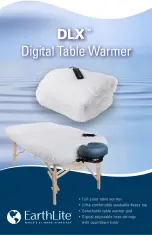
ii
installation
&
operation
manual
|
ocle
/
ocla
heating
system
IMPORTANT SAFETY INFORMATION
DANGER
!
Hazardous voltage:
Before wiring, servicing or cleaning the heating system, turn off the power and follow your
organization’s lockout and tagout procedure. Failure to do so could allow others to turn on the power unexpectedly,
resulting in harmful or fatal electrical shock.
WARNING
!
Electrical hazard:
All electrical work must be done by qualified personnel in accordance with national, state and
local codes.
CAUTION
!
Read instructions carefully:
The safety of any system incorporating this heater is the responsibility of the assembler.
The safe and proper use of this heater is dependent upon the installer following sound engineering practices. If the
equipment is used in a manner not specified by the manufacturer, the protection provided by the equipment may
be impaired. All applicable electrical safety standards defined by local jurisdictions must be followed. (Reference EU
directive 2014/35/EU in EU countries.)
•
Read carefully: Installers and operators of this equipment must be thoroughly familiar with the instructions in
this manual before commencing work.
•
Hot surfaces: Avoid contact with the system while it is in service. Some surfaces may remain hot even if the
system is not energized.
•
Proper lifting: Use proper lifting equipment and rigging to move this equipment. Create a plan before
attempting to move. Proper lifting locations are identified with labels on each system; use these locations
when lifting and mounting the system.
•
Rotating equipment: The heating system can start automatically and without warning. Avoid contact unless a
lockout at the service panel has been installed.
•
Grounding: The heater must be connected to a suitable ground (protective earthing conductor).
•
Overcurrent limiting: The power supply must be protected by a suitable overcurrent
limiting device.
•
Power disconnection: A means to disconnect the heater from the power supply is required.
HOTSTART
recommends that a power switch or circuit breaker be located near the heating system for safety and ease
of use.
NOTICE
EU Countries only:
Equipment rated for the conditions listed in EN 61010-1 1.4.1 Ingress protection rating IP54.
(Special conditions for specific applications may apply.)





































